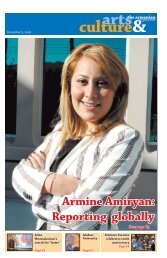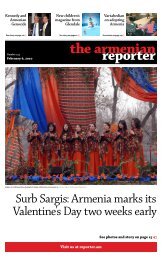National, International, Armenia, and Community News and Opinion
National, International, Armenia, and Community News and Opinion
National, International, Armenia, and Community News and Opinion
- No tags were found...
Create successful ePaper yourself
Turn your PDF publications into a flip-book with our unique Google optimized e-Paper software.
The <strong>Armenia</strong>n Reporter | November 8, 2008 21<strong>Armenia</strong><strong>Armenia</strong> Fund announces $30 million in pledgesDonors are based in<strong>Armenia</strong> <strong>and</strong> RussiaWeeks before annualtelethon, 2007record is smashedYEREVAN – The <strong>Armenia</strong> Fundannounced on November 3 thatsome 120 donors from <strong>Armenia</strong><strong>and</strong> Russia had pledged some $30million in donations to the fundduring a dinner held in Yerevanon November 1 under the auspicesof <strong>Armenia</strong>’s President SergeSargsian, who serves also as thechairperson of the fund’s Board ofTrustees.The <strong>Armenia</strong> Fund said the contributionswould be used primarilyfor the comprehensive developmentof rural areas in <strong>Armenia</strong> <strong>and</strong>Nagorno-Karabakh.The pledges were announced lessthan four weeks before the fund’sannual telethon, scheduled forThanksgiving Day, November 27.They surpass by far the pledges announcedduring last year’s telethon,which amounted to $15 million.The acting director of the <strong>Armenia</strong>Fund, Ara Vardanian told the<strong>Armenia</strong>n Reporter last week that$7.7 million of that total had beentransferred to the <strong>Armenia</strong> Fund’saccount in Yerevan as of October28, 2008.During the 2007 telethon, thefund announced contributions of$1 million from donors in <strong>Armenia</strong>The pain of an open wound<strong>and</strong> another $800,000 from donorsin Karabakh. The largest donationannounced in 2007 was a pledgefrom the Russia-based entrepreneurLevon Hairapetian to invest$2.5 million, though not throughthe <strong>Armenia</strong> Fund.According to the fund, pledgeswere made by Samvel Karapetian,Sergei Hambatzumian, GagikTzarukian, Seiran Karapetian,Genadi Stepanian, AshotKhachaturian, Mikhail Baghdasarov,Samvel Aleksanian,Barsegh Beglarian, Tigran Arzakantsian,the Zangezur coppermolybdenumplant, the MikayelVardanian Foundation, the EduardoEurnekian Group, ArmRus-GazProm, <strong>and</strong> Gharabagh Telecom.Details are to be announced duringthe telethon.fThe latest project completed by the <strong>Armenia</strong> Fund is Lovers’ Park in centralYerevan, adjacent to the Parliament building.n Continued from page 20at me. “Come… together,” he said.I repeated what he was doing. Hefrom above <strong>and</strong> I beginning at hislegs, started to check to see if hehad been squeezed or was “hookedon” to something. It turned outthat he was not. With the samecautiousness, we started to slowlypull the person out by holding on tothe bits of his clothes on his shoulders,waist <strong>and</strong> legs. It took us severalminutes to be able to get himout. The timing was perfect as just afew seconds later the concrete slabbroke in two <strong>and</strong> fell on the placewhere the man was found.Someone had already brought astretcher <strong>and</strong> we lifted our survivor,who was covered in dust <strong>and</strong>blood <strong>and</strong> placed him on it. To bemore accurate, we lifted him a bit,in order to place the stretcher underhim. At that moment his leftfoot, which was in my right h<strong>and</strong>,caught my attention. It was a distortedmass.The vehicle in which we placed theinjured left with blue lights flashing.The both familiar <strong>and</strong> unfamiliarman awakened me from my motionlessshock. “Good going brother. Youdid a good job. Here, smoke. It willhelp you relax,” he said. I had almosteverything in my small backpack:bread, water, vitamin C, b<strong>and</strong>ages,iodine, heart drops (for others), <strong>and</strong>warm clothes. The only thing I didnot have were cigarettes. I did notsmoke. Until that moment I was nota smoker. “He was probably your firstinjured,” said that unfamiliar manwhose name was Sergey. After receivinga positive answer, he added, “Donot worry. You will get used to it in abit. We removed the 8th person withour boys. I mean alive. Ten otherswere already dead.” He fell silent. Abit later we lost one another. He wentin a different direction <strong>and</strong> I starteddigging on a different pile with dozensof other people. That night wedid not find anyone alive. Sergey wasright; a few hours later, the horrifyingscenes no longer shocked me.The next morning, I decided tomove forward. I reached a bridge<strong>and</strong> went under it. It turned outto be Teryan street, where severalnine-story buildings used to st<strong>and</strong>side by side. In their place now weresmoking piles of concrete blocks.There I met students like me. Theywere geologists <strong>and</strong> they had comebetter prepared. They had tools <strong>and</strong>were trained. We worked on the ruinsside by side for three days; fivealive, including one child, seven oreight dead. This was the result ofthe work of the students <strong>and</strong> dozensof other men on those ruins.With every survivor, regardless if itwas in our section or elsewhere, weA birds’-eye view of Leninakan (Gyumri) from a helicopter.became excited <strong>and</strong> attacked theconcrete piles with renewed energy.With every dead body we kind oflost our hope. We found a coupleof corpses on one another, so weguessed that they had been on thestaircase. One of the boys, whosename I think was Ashot, said thatthey had probably been trying toescape, but the staircase was theweakest point of any building.True friendsI have not forgotten anything oralmost anything. And I cannot forget.Not those horrifying four days,not the voices, sometimes moaning<strong>and</strong> most of the time faint, thatwe could hear from under the ruins,<strong>and</strong> not our incapability to immediatelyhelp them. Nothing, neitherthe insufficient number of cranes,which were too weak for the job, norour complete unpreparedness. Weenvied the foreigners, who, as geologystudent Anahit said, “It seemsas if they are from Austria.” Weenvied them because they also hada dog <strong>and</strong> special tools which cutmetal <strong>and</strong> with the help of whichthey could open the necessary sectionof the ruins where people hadbeen trapped, several times fasterthan us. They were professionals.Is it possible to ever forget that?They say that you can know a truefriend in times of misfortune. Duringour misfortune the whole worldwas with us, next to us, sharing ourpain like the many-many Russians,Georgians, Kazakhs, Lithuanians,Ukrainians, Byelorussians, <strong>and</strong>though it seemed impossible duringthe reign of the Soviet Union:the French, Germans, Americans,Canadians, Arabs....They say (this is how GeneralAlex<strong>and</strong>er Lebed described in hisbook), when the Central TV stationof Moscow showed the scenes ofthe earthquake in Spitak <strong>and</strong> announcedthat thous<strong>and</strong>s of peoplehad died, only Baku <strong>and</strong> Azerbaijanshook … from the screams of joy<strong>and</strong> exclamations of happiness. Ialso cannot forget how wagons ofaid trains passing through Azerbaijanwere looted.I will not forget my fellow students<strong>and</strong> friends, whom I nevermet again <strong>and</strong> whose names I haveforgotten, as we barely spoke duringthe course of those horrifyingdays. Maybe we have met again,but we have not recognized one another.I will not forget how I barelyrecognized my own reflection – myface covered in dust <strong>and</strong> soot, withdisarranged hair <strong>and</strong> a cold expressionthat was “staring” at me fromthe mirror. That wasn’t me; it wassomeone who looked like me. I rememberthat on the third or fourthnight, when we were completelyexhausted, one of the locals tookus almost by force to an old stonehouse, saying that it belonged torenowned Poloz Mukuche. I will notforget that for the very first timein my life I drank medicinal alcohol.“They say it helps warm up <strong>and</strong>switches off the brain”; two wholecups, but I didn’t “switch off.”I will not forget the mountain ofcoffins made of unpolished woodplaced next to buildings. I will notforget how mad we would get afterseeing how buildings constructedonly 5–10 years previously collapsedinto ruins <strong>and</strong> how happywe were after seeing Khrushchevbuildings from the 60s damagedbut still st<strong>and</strong>ing…Comprehensive insurancecoverage for investorsProperty <strong>and</strong> CasualtyCargoAutoYour risk is our businessPrayers <strong>and</strong> poetryFor a long time after that I could notwatch television when they werebroadcasting scenes from the disaster.But when I did watch, my eyeswould well with tears <strong>and</strong> the imageswould start swimming in a floodof tears. Being raised in the Sovietreality, I did not know any prayers,I did not know how to pray. Thosetears that I shed were my prayers forthe more than 25 thous<strong>and</strong> victims.A 9 or 10 year old boy was st<strong>and</strong>ingnext to the ruins. His name wasOnnik - a common name in Gyumri.He was saying that he used to livein that building; on the seventhfloor. He could not find his fatheror mother. He was at school <strong>and</strong> he<strong>and</strong> his friends managed to escapeat the right time. He was not crying,but with a serious frozen expressionwas digging through the ruins withus, constantly hoping that his father<strong>and</strong> mother would show up <strong>and</strong>take him away. He only found someof his books, including Paruyr Sevak’svolumes of poetry. He huggedthe pieces of his previous life <strong>and</strong>silently wept, like a man. The nextday one of his relatives came; I thinkit was his maternal uncle. So it waspossible to see tears of happiness ina city already in mourning.For hundreds of thous<strong>and</strong>s, millionsof people, for an entire nation,life separated into two parts: “beforethe quake” <strong>and</strong> “after the quake.”And that “after” has continued for 20years now with still open wounds. fShort term coveragefor visitorsTravelIn Country MedicalAutoRenter’s Insurance
















